Thymosin Alpha-1 and Cystic Fibrosis (CF) are important topics in medical research. Recent studies show that Thymosin Alpha-1 in treating cystic fibrosis has great potential. It could improve the treatment of cystic fibrosis and offer better options for patients. Studies using cell lines and primary cultures have shown similar results. These findings give hope for managing both the symptoms and the root causes of CF.
Thymosin Alpha-1 helps enhance immune function and lower the inflammatory response. It also supports plasma membrane stability and repairs damage from cystic fibrosis mutations. Research highlights its role in improving CFTR function, which is vital for ion channel activity. Scientists use methods like cell surface biotinylation assays to study these effects at the cellular level.
Switzerland Researchers continue to explore new benefits of Thymosin Alpha-1. It may reduce oxidative damage in cancer cells and improve the balance of amino acids in cells. Studies are also looking into how it works with compounds like epigallocatechin gallate to increase its impact. Ethical research practices, such as requiring informed consent, guide these efforts.
Thymosin Alpha-1 could transform how CF is managed. It addresses cystic fibrosis mutations, improves plasma membrane stability, and enhances CFTR function. These effects may lead to better quality of life for people living with this chronic condition.
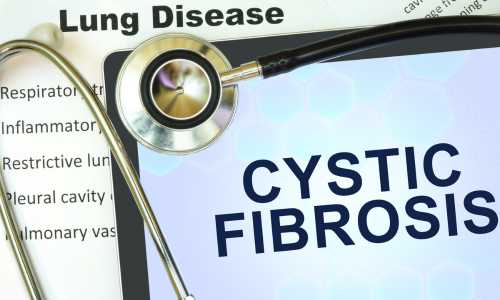
Cystic Fibrosis (CF) is an inherited condition that affects the lungs and digestive system. It is marked by thick, sticky mucus. This mucus can block airways and allow bacteria to grow. These blockages often lead to serious respiratory and digestive problems.
Although there have been significant advancements in CF treatment, managing the condition is still complex. Effective care requires a comprehensive approach. This includes medication, physical therapy, and nutritional support.
The current treatment for CF involves a combination of drugs. These include CFTR modulators, antibiotics, mucolytics, and anti-inflammatory agents. These treatments aim to manage symptoms and improve quality of life. However, they do not cure the disease.
The high morbidity and mortality rates linked to CF highlight the urgent need for new therapies. Here, Thymosin Alpha-1 in treating cystic fibrosis has emerged as a promising approach. It offers potential new hope for improving outcomes in CF patients.
Visit our designated page on Thymosin Alpha-1 to discover more information and potential treatments for this fascinating peptide. From this page Direct Peptides Switzerland offers a variety of Tα-1 peptides for sale including vials, nasal sprays, pre-mixed peptide pens and stacks.
Thymosin Alpha-1 (Tα-1) is a peptide hormone derived from the thymus gland. It is known for its immunomodulatory properties. Tα-1 plays a crucial role in the maturation and differentiation of T-cells. These cells are essential for the adaptive immune response.
Tα-1 enhances the body’s ability to fight infections and modulate immune responses. This makes it an attractive therapeutic option for various diseases, including CF.
The mechanism of action of Tα-1 involves binding to specific receptors on immune cells. This binding leads to the activation and proliferation of these cells. Activated cells can respond better to pathogens and clear infections. Additionally, Tα-1 regulates the production of cytokines.
Cytokines are signalling molecules that mediate inflammation and immune responses. By modulating the immune system, Tα-1 can reduce the chronic inflammation seen in CF patients. This may improve their overall health outcomes.
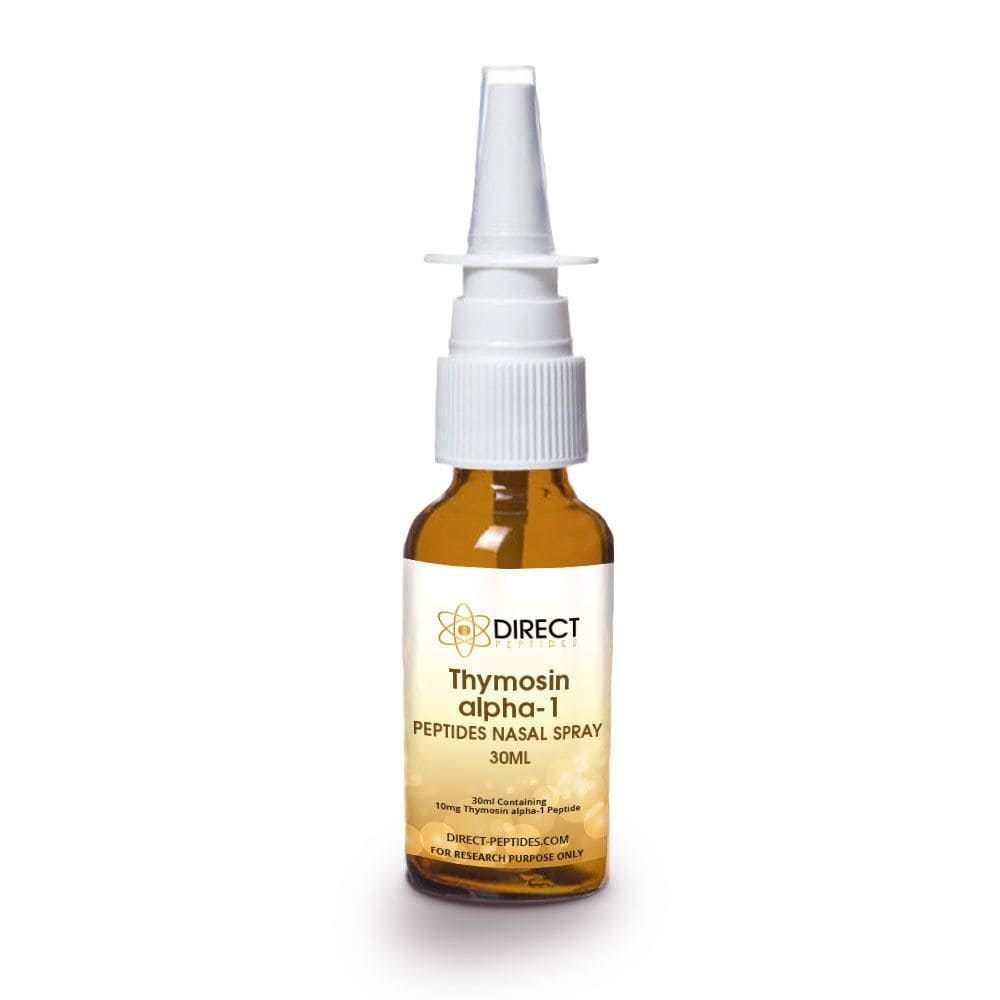
Tα-1’s role in the immune system is multifaceted. It involves both innate and adaptive immunity. In CF, chronic lung infections and inflammation are common. Tα-1’s immunomodulatory effects can be especially beneficial.
By enhancing T-cell function and regulating cytokine production, Tα-1 helps control infections. It also reduces inflammation, addressing two critical aspects of CF pathology.
Tα-1 has direct effects on immune cells. It also promotes the repair and regeneration of damaged tissues. This regenerative ability is vital for CF patients.
Persistent infections and inflammation frequently damage their lung tissues. By facilitating tissue repair, Tα-1 may improve lung function. It could also slow disease progression in CF patients.
Explore the full range of Peptide Nasal Sprays for research from Direct Peptides Switzerland.
Several Switzerland clinical studies have explored the potential of Thymosin Alpha-1 in treating Cystic Fibrosis, with promising results. One notable study showed that Tα-1 given to CF patients significantly reduced pulmonary exacerbations. It also improved lung function. These findings suggest that Tα-1 can make existing CF therapies more effective and provide additional benefits.
Preclinical studies using animal models of CF support this potential. Tα-1 reduced lung inflammation and bacterial load in these models. This evidence highlights its value as an adjunctive therapy. These findings show the need for more research into Tα-1’s mechanisms and effects in CF. Fully understanding its therapeutic potential will require continued study.
Discover the synergistic benefits of the Thymosin Alpha-1 and LL-37 peptide stack from Direct Peptides Switzerland. This powerful duo amplifies each other’s capabilities, significantly enhancing immune function.
To expand the exploration of Thymosin Alpha-1 in treating cystic fibrosis, researchers have introduced innovative formulations. These formulations combine Thymosin Alpha-1 and LL-37. These products are designed for preclinical research.
They help advance the understanding of immune modulation. They also focus on chloride channel function and inflammation control in CF pathology. Below are the key products used in these investigations:
This combination therapy merges the immunomodulatory effects of Thymosin Alpha-1 with LL-37’s anti-inflammatory properties. Research using primary bronchial epithelial cells and cell culture has shown beneficial effects. These studies focus on stabilizing the apical membrane of many epithelia and improving CF therapy.
Switzerland Researchers examined its role in enhancing the transmembrane conductance regulator (CFTR) function, a key CF treatment target. Experiments involved western blot analysis and positive control samples. These showed improved protein expression in CFTR and the repair of conformational defects caused by mutations.
Modified thymosin alpha, when paired with combinations of correctors, showed greater therapeutic scope. Institutions like Chapel Hill and the University of North Carolina used mass spectrometers to measure molecular weight changes in CFTR proteins.
This nasal formulation focuses on research involving bronchial epithelia affected by CF. It stabilizes the plasma membrane, addressing damage caused by defective ion transport through the chloride channel.
Studies on primary bronchial epithelia showed how it repaired misprocessed proteins in the endoplasmic reticulum and enhanced their movement to the cell surface.
Research findings from n engl j med and j cyst fibros highlighted its potential. Preclinical trials demonstrated statistical significance in reducing inflammation and enhancing immune response in lung disease models.
Switzerland Researchers paired it with pharmacological chaperones to correct misfolded proteins at room temperature. This nasal stack continues to contribute to the study of Thymosin Alpha-1 in treating cystic fibrosis.
Visit the Thymosin Alpha-1 & LL-37 Nasal Stack product page.
This pen is precise and suited for preclinical research. Researchers used it to study basal cells and bronchial epithelia cells through western blot methods. The studies showed restored cell surface integrity and reduced apoptotic cells in various experiments.
Reagents like formic acid and acetic acid helped in sample preparation for further analysis. Researchers used tools like scientific instruments from Santa Cruz Biotechnology to regulate flow rates and observe results.
The Thymosin Alpha-1 pen supported tissue repair in airway disease models. Its promise is also evident in studies involving fibrosi cistica.
Learn more about the Thymosin Alpha-1 on its category page.
LL-37 is a naturally occurring polypeptide known for its tissue-repair properties. Its pen formulation is widely applied in CF research. Studies, supported by the Cystic Fibrosis Foundation, examined its role in reducing oxidative stress and improving clinical phenotypes in epithelial cells.
The pen allowed precise targeting in studies focused on CF-related lung disease. It showed efficacy in lowering apoptotic cell counts and repairing damage caused by mutations.
Advanced research tools like google scholar and van goor f helped validate its success. In lung transplant models, its potential as an adjunctive treatment is being explored.
Find out more about the LL-37 on its category page.
Potential side effects of Thymosin Alpha-1 in treating cystic fibrosis include mild fever, fatigue, and flu-like symptoms. In some cases, there may be injection site reactions like redness or swelling. It’s crucial to consult a healthcare provider for guidance and monitoring when using this treatment.
Despite the promising results, several challenges must be addressed before Tα-1 can be widely used as a therapy for CF. One major challenge is optimising dosing regimens. This ensures maximum efficacy while minimising side effects. Long-term studies are also needed to assess the safety and effectiveness of Tα-1 in CF patients over extended periods.
Another critical area for research is understanding how Tα-1 interacts with other CF treatments. CF patients often receive multiple medications. It is essential to determine how Tα-1 fits into existing treatment protocols to achieve the best outcomes.
Collaborative efforts between researchers, clinicians, and pharmaceutical companies will be key. These efforts can address these challenges and advance Thymosin Alpha-1 in treating Cystic Fibrosis.
Shop Pre-Mixed Peptide Pens from Direct Peptides Switzerland, we have a full range of peptides pre mixed with bacteriostatic water to provide convenience in reducing preparation time and ease of use for researchers.
The introduction of Thymosin Alpha-1 in treating Cystic Fibrosis is a major step forward. It advances efforts to improve patient outcomes. Its unique immunomodulatory properties and ability to promote tissue repair make Tα-1 a valuable addition to CF therapies.
There are still challenges, but evidence supporting Tα-1’s efficacy and safety continues to grow. This evidence provides a strong foundation for future research and clinical trials.
To fully realise the potential of Thymosin Alpha-1 in treating Cystic Fibrosis, collaboration is essential. Researchers, clinicians, and industry stakeholders must work together. This teamwork can speed up the development of Tα-1-based therapies and bring them to patients who need new treatment options.
We encourage all interested parties to join this effort. Contributing to the growing knowledge on Tα-1 and its applications in CF is vital.
[1] Garaci E. From thymus to cystic fibrosis: the amazing life of thymosin alpha 1. Expert Opin Biol Ther. 2018 Jul;18(sup1):9-11.
[2] Romani L, Oikonomou V, Moretti S, Iannitti RG, D’Adamo MC, Villella VR, Pariano M, Sforna L, Borghi M, Bellet MM, Fallarino F, Pallotta MT, Servillo G, Ferrari E, Puccetti P, Kroemer G, Pessia M, Maiuri L, Goldstein AL, Garaci E. Thymosin α1 represents a potential potent single-molecule-based therapy for cystic fibrosis. Nat Med. 2017 May;23(5):590-600. doi: 10.1038/nm.4305. Epub 2017 Apr 10. Erratum in: Nat Med. 2018 Sep;24(9):1481.
[3] Bellet MM, Borghi M, Pariano M, Renga G, Stincardini C, D’Onofrio F, Brancorsini S, Garaci E, Costantini C, Romani L. Thymosin alpha 1 exerts beneficial extrapulmonary effects in cystic fibrosis. Eur J Med Chem. 2021 Jan 1;209:112921.
[4] A M Cantin & J W Hanrahan (2017) Thymosin α1: a single drug with multiple targets in cystic fibrosis – Nature Medicine, 5 May 2017, Volume 23, pages 536–538.
[5] Duplantier AJ, van Hoek ML. The Human Cathelicidin Antimicrobial Peptide LL-37 as a Potential Treatment for Polymicrobial Infected Wounds. Front Immunol. 2013 Jul 3;4:143.
[6] Koehler DR, Hitt MM, Hu J. Challenges and strategies for cystic fibrosis lung gene therapy. Mol Ther. 2001 Aug;4(2):84-91.
By following these steps and leveraging the potential of Tα-1, we can make significant strides in improving the lives of CF patients. Let’s continue to push the boundaries of science and explore new frontiers in CF treatment.
Shop ALL Peptide Vials from Direct Peptides Switzerland, premium research-grade peptides with +99% purity.
Research shows Thymosin Alpha 1 can reduce lung inflammation in cystic fibrosis models by modulating immune activity and lowering inflammatory signals. Studies in cells and animals report improved CFTR stability and less airway irritation. These findings suggest Thymosin Alpha 1 may support inflammation control, although clinical confirmation remains limited.
Current evidence does not show that Thymosin Alpha 1 works for all cystic fibrosis mutations. Most research focuses on F508del models, and results remain mixed even for this mutation. No studies confirm broad mutation coverage, so its effects appear mutation specific and remain under investigation.
Studies indicate Thymosin Alpha 1 can support antioxidant defenses and reduce oxidative stress in experimental models. Research links it to improved cellular balance and reduced damage from reactive molecules. In cystic fibrosis models, it may help regulate inflammatory and oxidative pathways, though clinical data remain limited.
Research in cystic fibrosis models shows Thymosin Alpha 1 may help protect tissues by reducing inflammation and supporting healthier cellular processes. Studies report improved epithelial stability and partial correction of dysfunction in experimental systems. These findings suggest a supportive role, but direct repair of advanced structural damage remains unproven.
Thymosin Alpha 1 is not FDA approved for cystic fibrosis. It remains an investigational peptide in the United States with no approved therapeutic indication. Some regions use related formulations for other conditions, but none hold approval for CF. Current research focuses on preclinical evaluation rather than clinical treatment.
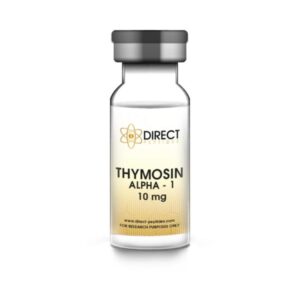
New Reduced Price
New Reduced Price
New Reduced Price
TWIN PACKS
Thymosin Alpha-1 Peptide Vial
£56.25 – £101.25Price range: £56.25 through £101.25 Select options This product has multiple variants. The options may be chosen on the product page
New Reduced Price
New Reduced Price
New Reduced Price
New Reduced Price
Thymosin Alpha1 Pre-Mixed Pen 10mg Peptide
£58.83 – £158.84Price range: £58.83 through £158.84 Select options This product has multiple variants. The options may be chosen on the product page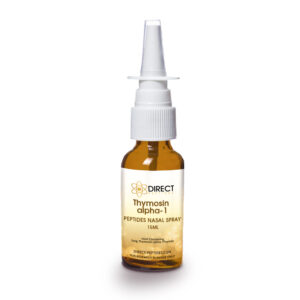
New Reduced Price
New Reduced Price
New Reduced Price
Thymosin Alpha-1 Nasal Spray
£64.25 – £123.50Price range: £64.25 through £123.50 Select options This product has multiple variants. The options may be chosen on the product page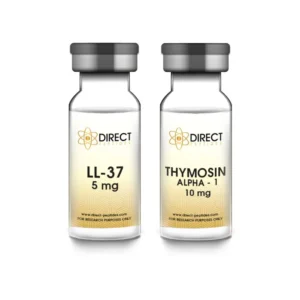
LL-37 Thymosin Alpha-1 Peptide
£85.58 – £94.56Price range: £85.58 through £94.56 Select options This product has multiple variants. The options may be chosen on the product pageALL CONTENT AND PRODUCT INFORMATION AVAILABLE ON THIS WEBSITE IS FOR EDUCATIONAL PURPOSES ONLY.
DISCLAIMER: These products are intended solely as a research chemical only. This classification allows for their use only for research development and laboratory studies. The information available on our Switzerland Direct Peptides website: https://direct-peptides.com is provided for educational purposes only. These products are not for human or animal use or consumption in any manner. Handling of these products should be limited to suitably qualified professionals. They are not to be classified as a drug, food, cosmetic, or medicinal product and must not be mislabelled or used as such.